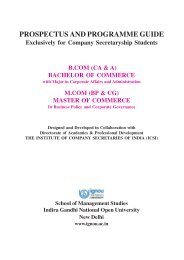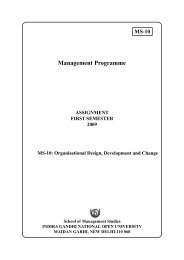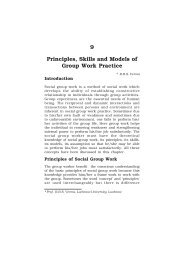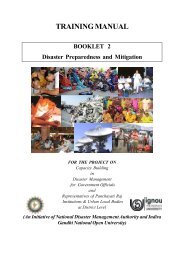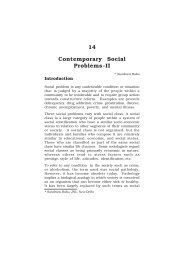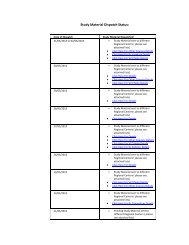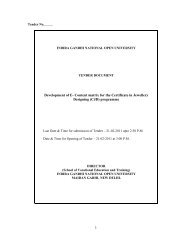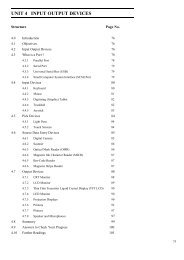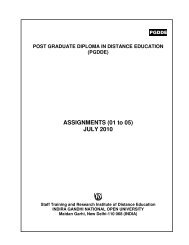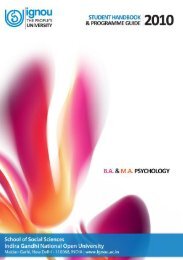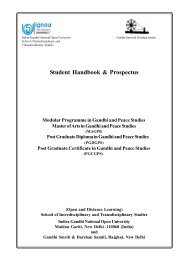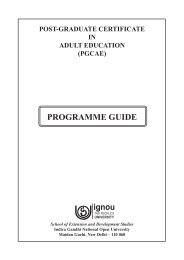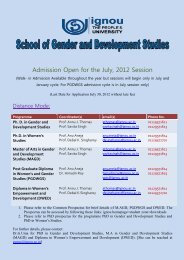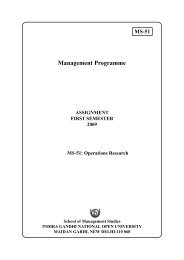cover pros - IGNOU
cover pros - IGNOU
cover pros - IGNOU
You also want an ePaper? Increase the reach of your titles
YUMPU automatically turns print PDFs into web optimized ePapers that Google loves.
1.8 Support Services<br />
In order to provide individualized support to its learners, the University has a large number of Study<br />
Centres, spread throughout the country. These Study Centres are co-ordinated by Regional Centres<br />
and Recognised Regional Centres. At the Study Centres, the learners interact with the Academic<br />
Counsellors and other learners, refer to books in the Library, watch/listen to video/ audio programmes<br />
and interact with the Coordinator on administrative and academic matters. The list of Regional and<br />
Study Centres is given in this handbook. Support services are also provided through Work Centres,<br />
Programme Study Centres, Skill Development Centres and Special Study Centres.<br />
1.9 Programme Delivery<br />
The methodology of instruction in this University is different from that of the conventional Universities.<br />
The Open University system is more learner-oriented and the learner is an active participant in the<br />
pedagogical (teaching and learning) process. Most of the instructions are imparted through distance<br />
education methodology and face-to-face mode as per the requirement.<br />
The University follows a multimedia approach for instruction, which comprises:<br />
a) Self Instructional Written Material: The printed study material (written in self-instructional<br />
style) for both theory and practical components of the programmes is supplied to the learners<br />
in batches of blocks for every course (on an average 1 block per credit). A block which<br />
comes in the form of a booklet usually comprises 3 to 6units.<br />
b) Audio-Visual Material Aids: The learning package contains audio and video CDs which<br />
have been produced by the University for better clarification and enhancement of understanding<br />
of the course material given to the learners. A video programme is normally of 25-30<br />
minutes duration. The video cassettes are screened at the study centres during specific<br />
sessions which are duly notified for the benefit of the learners.<br />
The video programmes are telecast on National Network of Doordarshan and Gyan Darshan.<br />
All Gyan Vani stations are broadcasting curriculum based audio programmes. In addition,<br />
some selected stations of All India Radio are also broadcasting the audio programmes.<br />
Learners can confirm the dates for the programmes from their study centres. The information<br />
is also provided through the university website.<br />
c) Counselling Sessions: Normally counselling sessions are held as per schedule drawn by the<br />
Study Centres. These are mostly held non-working hours of the host institutions where the<br />
study centres are located. Attendance in 80% of counselling sessions is compulsory.<br />
d) Teleconferences: Live teleconferencing sessions are conducted via satellite through interactive<br />
Gyan Darshan Channelas as well as simulcasted on ‘Edusat’ channel from the University<br />
studios at EMPC, the schedule of which is made available at the study centres.<br />
e) Practical/Project Work: the Certificate Programme has a compulsory component of Project<br />
Work. As a part of the Project Work, you will be expected to carry out various practical<br />
papers with the young children with cerebral palsy/mental retardation/visual impairment/<br />
hearing impairment throughout the year. A Project Manual will be provided along with the<br />
Study Materials to help you do the Project Work.<br />
10



